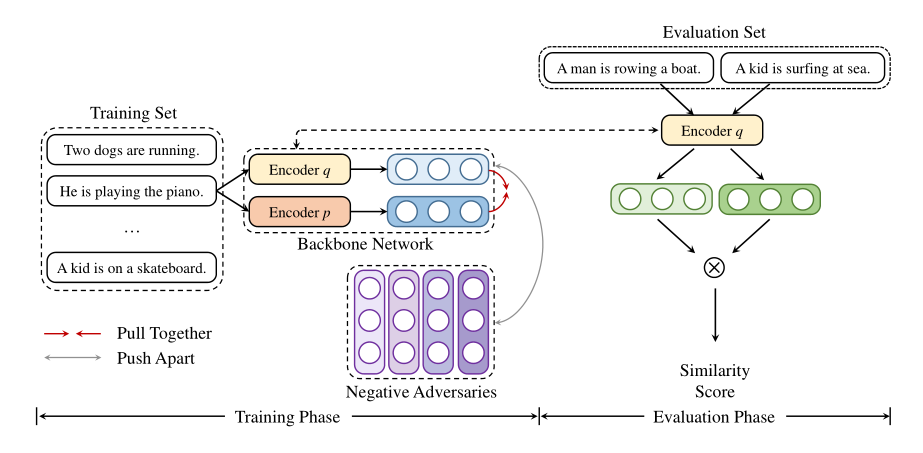This repository contains the source code for our paper AdCSE: An Adversarial Method for Contrastive Learning of Sentence Embeddings.
In this article, we demonstrate that high-quality negative representations introduced by adversarial training help to learn powerful sentence embeddings. We design a novel method for unsupervised sentence embedding named AdCSE. It consists of an untied dual-encoder backbone network for embedding positive sentence pairs and a group of negative adversaries for training hard negatives. These two parts of AdCSE compete against each other mutually in an adversarial way for contrastive learning, obtaining the most expressive sentence representations while achieving an equilibrium.
Experiments on 7 STS tasks show the effectiveness of AdCSE. The superiority of this model in constructing high-quality sentence embeddings is also validated by ablation studies and quality analysis of representations.
In the following section, we describe how to train a AdCSE model by using our code.
First, install PyTorch by following the instructions from the official website. To faithfully reproduce our results, please use the correct 1.7.1 version corresponding to your platforms/CUDA versions. PyTorch version higher than 1.7.1 should also work. For example, if you use Linux and CUDA11 (how to check CUDA version), install PyTorch by the following command,
pip install torch==1.7.1+cu110 -f https://download.pytorch.org/whl/torch_stable.htmlIf you instead use CUDA <11 or CPU, install PyTorch by the following command,
pip install torch==1.7.1Then run the following script to install the remaining dependencies,
pip install -r requirements.txtOur evaluation settings are just the same as SimCSE (Gao et al., 2021), so we directly use the evaluation code from their repo. AdCSE evaluates sentence embeddings on semantic textual similarity (STS) tasks and downstream transfer tasks. For STS tasks, our evaluation takes the "all" setting, and report Spearman's correlation.
Before evaluation, please download the evaluation datasets by running
cd SentEval/data/downstream/
bash download_dataset.shThen come back to the root directory, you can evaluate AdCSE using our evaluation code. For example,
python evaluation.py \
--model_name_or_path result/AdCSE \
--pooler cls_before_pooler \
--task_set sts \
--mode test--model_name_or_path: Path of the evaluated model.--pooler: Pooling method during evaluation. To reproduce results in our paper, it should be set tocls_before_poolerwhich is different from the training phase.
Data
For AdCSE, we use 1 million randomly sampled sentences from English Wikipedia which are provided by SimCSE. You can run the script data/download_wiki.sh to download this dataset.
Training scripts
We provide an example training script run_adcse.sh for AdCSE. Note that we only support single-GPU for AdCSE right now.
We explain the arguments in following:
-
--train_file: Training file path. We support "txt" files (one line for one sentence) and "csv" files (2-column: pair data with no hard negative; 3-column: pair data with one corresponding hard negative instance). You can use the provided Wikipedia data, or you can use your own data with the same format. -
--model_name_or_path: Pre-trained checkpoints to start with. -
--learning_rate: Learning rate of encoder$q$ . -
--pooler_type: Pooling method. It's the same as the--pooler_typein the evaluation part. -
--mlp_only_train: We have found that for unsupervised AdCSE, it works better to train the model with MLP layer but test the model without it. You should use this argument when training unsupervised AdCSE models. -
--moco_m: Momentum for updating encoder$p$ . -
--moco_t: Temperature for the contrastive loss$L$ . -
--mem_m: Momentum for updating negatives adversaries. -
--mem_t: Temperature for updating negatives adversaries. -
--mem_lr: Learning rate for negatives adversaries. -
--mem_wd: Weight decay for updating negatives adversaries. -
--neg_num: Number of negatives adversaries.
All the other arguments are standard Huggingface's transformers training arguments. Some of the often-used arguments are: --output_dir, --learning_rate, --per_device_train_batch_size. In our example scripts, we also set to evaluate the model on the STS-B development set (need to download the dataset following the evaluation section) and save the best checkpoint.
For results in the paper, we use Nvidia 3090 GPUs with CUDA 11. Using different types of devices or different versions of CUDA/other softwares may lead to slightly different performance.
Hyperparameters
We use the following hyperparamters for training AdCSE:
| AdCSE | |
|---|---|
| Batch size | 64 |
| Learning rate of encoder |
3e-5 |
| Learning rate of negative adversaries | 3e-3 |
| Max_seq_length | 32 |
| Tempareture for |
0.05 |
| Momentum for encoder |
0.995 |
| Weight decay for negative adversaries | 1e-4 |
| Number of hard negatives | 64 |
Please cite our paper if you use AdCSE in your work:
@inproceedings{li2022adcse,
title={AdCSE: An Adversarial Method for Contrastive Learning of Sentence Embeddings},
author={Li, Renhao and Duan, Lei and Xie, Guicai and Xiao, Shan and Jiang, Weipeng},
booktitle={International Conference on Database Systems for Advanced Applications},
pages={165--180},
year={2022},
}